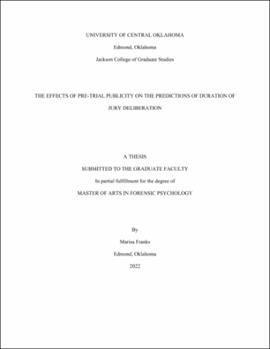| dc.contributor.advisor | Maass, Jaclyn | |
| dc.contributor.author | Franks, Marisa | |
| dc.date.accessioned | 2022-07-21T14:22:26Z | |
| dc.date.available | 2022-07-21T14:22:26Z | |
| dc.date.issued | 2022 | |
| dc.identifier.other | (AlmaMMSId)9982871710502196 | |
| dc.identifier.uri | https://hdl.handle.net/11244/335950 | |
| dc.description.abstract | Pre-trial publicity can result in juror bias, memory errors, and biased perceptions, leading to issues within trials and jury deliberation. It is nearly impossible to avoid due to media and that publicity having multiple outlets to share information. Multiple methods have been researched in their ability to reduce the effects of PTP, but only minimally. Past research has found that PTP increases the likelihood of a guilty verdict and exposure to it will decrease the chance of a fair trial with impartial jurors. This study examines how negative PTP regarding specific people affects the predicted length of deliberation, rate of guilty verdicts, and predicted confidence in final decisions. A total of 106 participants were recruited for this study, with an average of 26 participants in each of the four conditions. Participants were recruited through a campus-wide email blast. The survey consisted of demographic questions, article summaries pertaining to the defendant, victim, both, or crime in general, and an edited video of the NJ vs. Bias trial. Participants then completed a survey containing questions about the verdict they believed they would choose, the verdict they believed the jury would choose, their confidence in those decisions, whether they believed the PTP affected their decisions and would affect the jury’s decision, and whether PTP should be limited or restricted before and during trials. There were no significant results for predicted deliberation times, predicted jury verdicts, individual decisions, or confidence ratings between any PTP exposure conditions. Results of this study do not indicate that PTP regarding different subjects has significant effects on juror decisions and predicted jury verdicts. However, changes to exposure time and retention intervals could potentially yield different results if a similar study is performed again in the future. Future research should focus on creating more real-world jury simulations in order to gain a greater understanding of PTP’s effects and how to mitigate them. | en_US |
| dc.rights | All rights reserved by the author, who has granted UCO Chambers Library the non-exclusive right to share this material in its online repositories. Contact UCO Chambers Library's Digital Initiatives Working Group at diwg@uco.edu for the permission policy on the use, reproduction or distribution of this material. | |
| dc.subject.lcsh | Jury | |
| dc.subject.lcsh | Decision making | |
| dc.subject.lcsh | Free press and fair trial | |
| dc.title | The effects of pre-trial publicity on the predictions of duration of jury deliberation | en_US |
| dc.type | Academic theses | |
| dc.contributor.committeeMember | Limke-McLean, Alicia | |
| dc.contributor.committeeMember | Mabry, John | |
| dc.thesis.degree | M.S., Forensic Psychology | |
| dc.subject.keywords | Guilt ratings | |
| dc.subject.keywords | Jury deliberation | |
| dc.subject.keywords | Pre-trial publicity | |
| dc.subject.keywords | Priming | |
| dc.identifier.oclc | (OCoLC)1336930438 | |
| thesis.degree.grantor | Jackson College of Graduate Studies | |
